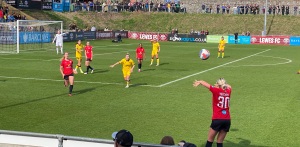(This item first appeared in the Brighton Argus on 24th April 2024)
I’m told that I am rapidly turning into Victor Meldrew, grumbling and complaining at the smallest incident that annoys me. On Saturday, I was unable to find the stream for a rugby game from Cape Town that I had been looking forward to watching. Apparently, according to my wife and daughter, I kept muttering: “I don’t believe it”. The daughter’s boyfriend even called me Victor, thus making us two peas in a pod. I finally found the stream on BBC Wales but the commentary was in Welsh. My mood wasn’t helped by my beloved Stormers being beaten by the Ospreys from Cardiff.
In mainstream sport, there have been two decisions taken in recent weeks that have put me in Victoria-Meldrew-on-steroids mode. These decisions demonstrate that both football and cricket are run for the benefit of elite clubs rather than for all.
In football, the Football Association and the Premier League have decided that no longer will there be replays in the FA Cup. There was no consultation with Football League, National League or grassroots clubs for whom the competition represents not only their best opportunity to create life-long memories for supporters but also a hugely important source of income. FA Council members were not consulted about the changes. The decision, and the way it was taken, demonstrate a total lack of respect for the football pyramid and its fans. Football belongs to all of us and decisions should not be taken in back room deals in which only the very wealthiest clubs are allowed to participate.
 Those behind this decision are the clubs that compete regularly in European football competitions. They complain that there are too many fixtures and, for them, the FA Cup is a minor irritation, especially in the early rounds when they run the risk of slumming it with the likes of Yeovil Town, Crawley and Stoke City. After all , what sums up the FA Cup better than a replay on a cold Tuesday night in Stoke? Even worse, the foreign-owned clubs might get drawn away against a non-League side. My fantasy fixture would be either of the Manchester teams, City or United, being drawn away at The Dripping Pan to face the Mighty Rooks, Lewes FC. A replay could mean that their pristine grounds being contaminated by teams from the lower leagues and, worse still, plebs like me who support the likes of Lewes.
Those behind this decision are the clubs that compete regularly in European football competitions. They complain that there are too many fixtures and, for them, the FA Cup is a minor irritation, especially in the early rounds when they run the risk of slumming it with the likes of Yeovil Town, Crawley and Stoke City. After all , what sums up the FA Cup better than a replay on a cold Tuesday night in Stoke? Even worse, the foreign-owned clubs might get drawn away against a non-League side. My fantasy fixture would be either of the Manchester teams, City or United, being drawn away at The Dripping Pan to face the Mighty Rooks, Lewes FC. A replay could mean that their pristine grounds being contaminated by teams from the lower leagues and, worse still, plebs like me who support the likes of Lewes.
In cricket, the England and Wales Cricket Board (ECB) confirmed last week the eight First Class Counties who have been successful in their bid to be awarded Tier 1 women’s team status from 2025: Durham, Essex, Hampshire, Lancashire, Nottinghamshire, Somerset, Surrey, and Warwickshire. Joining them, by 2027, will be Glamorgan and Yorkshire, who have been named as the first two Tier 1 expansion teams. Sussex and Kent, who have done so much to nurture women’s cricket in this country, have been excluded. As longstanding Sussex supporter Steve Hanson said, “Sussex were the forerunners for women’s cricket” and that “we staged matches when no-one was interested and now they don’t want us.”
The decision on who to include was not taken on cricketing performance. Had this been so, Sussex, led so well by Georgia Adams, would have definitely been included. They have won the Women’s County Championship six times since 2003 (twice as many championships than the Sussex men have ever achieved), and have won the Women’s Twenty20 Cup twice in the 15 years of that competition. Last year, playing as the Sussex Vipers, coached by the former England captain Charlotte Edwards, they won the Rachel Heyhoe Flint Trophy and retained the Charlotte Edwards Cup.
The ECB has announced that First Class Counties like Sussex, who were not awarded Tier 1 status, will now be involved in a process to determine the composition of Tier 2 and Tier 3 which will also involve National Counties (i.e. not First Class Counties) in the new-look women’s domestic competition structure. But what is as egregious as the decision to exclude the likes of Sussex and Kent, is the decision that for the duration of the 2025-2028 seasons all three tiers will be ‘closed’, with no promotion or relegation. How ridiculous and how protectionist it is that the favoured few will be guaranteed a spot in the elite Tier 1, no matter how poor their cricket and how deserving the winners of Tier 2 might be.
Clearly merit is not something the ECB cares about, and women’s cricket will be the poorer for this shameful decision.











